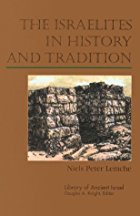
This post is based primarily on a few pages in The Mythic Past by Thomas L. Thompson. It is slightly supplemented by fewer notes from a different but complementary discussion on the biblical meanings of “the people of God” in The Israelites in History and Tradition by Niels Peter Lemche. (All bold fonts for emphasis or highlighting key points for ease of reading are mine.)
I conclude with my own thoughts on what all of this means for the first of our Gospels.
The biblical tradition informs us of the meaning and understanding that the biblical authors’ contemporaries attributed to the past. Archaeological evidence points to a different reality of the past.
The religious understanding of Israel’s origin myth
The primary biblical referent for Israel’s ethnic and family identification is found in the stories and metaphors of “exodus”, “wilderness”, “exile” and “return”. Even in the Books of Kings the narrative is couched in the suspense of threats and promises of exile from the land. These themes centre on the motif of the children of Israel as the “people of God”, as Jahweh’s “first-born” and God’s “inheritance”.
These stories all are solidly rooted in the self-defining, grand epochal line of a God without a home or a people [and who was] searching for a people without a home or a God. It is in this metaphor that we find the foundation and matrix for the ethnographic metaphor of all Israel. This metaphor gives voice to the ‘new Israel’ with its centre in Yahweh’s temple of the ‘new Jerusalem’. This is an identity that is formed from the perspective of the sectarian theology of the way. (pp. 255-56, The Mythic Past by Thomas L. Thompson)
Compare Niels Peter Lemche’s observation of the nature of Israel’s origin myth: Continue reading “Where did the Bible’s Jews come from? Part 1”

 This post is based on a discussion by Niels Peter Lemche in
This post is based on a discussion by Niels Peter Lemche in